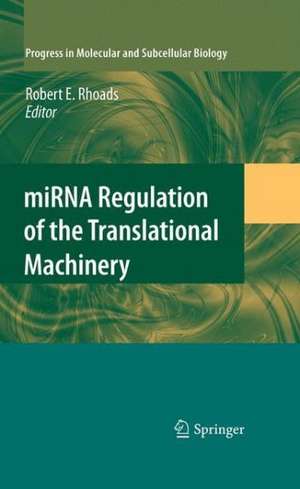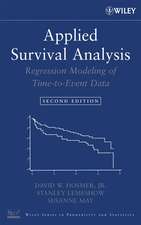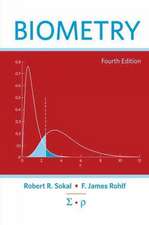miRNA Regulation of the Translational Machinery: Progress in Molecular and Subcellular Biology, cartea 50
Editat de Robert E. Rhoadsen Limba Engleză Paperback – 14 mar 2012
| Toate formatele și edițiile | Preț | Express |
|---|---|---|
| Paperback (1) | 632.22 lei 6-8 săpt. | |
| Springer Berlin, Heidelberg – 14 mar 2012 | 632.22 lei 6-8 săpt. | |
| Hardback (1) | 636.80 lei 6-8 săpt. | |
| Springer Berlin, Heidelberg – 18 noi 2009 | 636.80 lei 6-8 săpt. |
Din seria Progress in Molecular and Subcellular Biology
- 18%
 Preț: 1115.46 lei
Preț: 1115.46 lei - 18%
 Preț: 1403.04 lei
Preț: 1403.04 lei - 18%
 Preț: 1112.30 lei
Preț: 1112.30 lei - 18%
 Preț: 1117.03 lei
Preț: 1117.03 lei - 18%
 Preț: 1222.49 lei
Preț: 1222.49 lei - 18%
 Preț: 1382.21 lei
Preț: 1382.21 lei - 18%
 Preț: 1232.26 lei
Preț: 1232.26 lei - 18%
 Preț: 1222.80 lei
Preț: 1222.80 lei - 24%
 Preț: 1045.93 lei
Preț: 1045.93 lei - 18%
 Preț: 956.50 lei
Preț: 956.50 lei -
 Preț: 387.20 lei
Preț: 387.20 lei - 15%
 Preț: 639.73 lei
Preț: 639.73 lei - 15%
 Preț: 633.19 lei
Preț: 633.19 lei - 15%
 Preț: 634.18 lei
Preț: 634.18 lei - 15%
 Preț: 634.00 lei
Preț: 634.00 lei - 15%
 Preț: 640.24 lei
Preț: 640.24 lei - 5%
 Preț: 714.27 lei
Preț: 714.27 lei - 15%
 Preț: 634.32 lei
Preț: 634.32 lei - 15%
 Preț: 637.28 lei
Preț: 637.28 lei - 15%
 Preț: 637.78 lei
Preț: 637.78 lei - 15%
 Preț: 637.28 lei
Preț: 637.28 lei - 15%
 Preț: 649.06 lei
Preț: 649.06 lei -
 Preț: 387.75 lei
Preț: 387.75 lei - 18%
 Preț: 1220.75 lei
Preț: 1220.75 lei - 18%
 Preț: 1224.99 lei
Preț: 1224.99 lei - 18%
 Preț: 946.87 lei
Preț: 946.87 lei - 15%
 Preț: 633.35 lei
Preț: 633.35 lei - 18%
 Preț: 944.36 lei
Preț: 944.36 lei -
 Preț: 387.96 lei
Preț: 387.96 lei - 15%
 Preț: 633.02 lei
Preț: 633.02 lei - 15%
 Preț: 640.88 lei
Preț: 640.88 lei - 5%
 Preț: 720.10 lei
Preț: 720.10 lei
Preț: 632.22 lei
Preț vechi: 743.79 lei
-15% Nou
Puncte Express: 948
Preț estimativ în valută:
120.98€ • 129.36$ • 100.87£
120.98€ • 129.36$ • 100.87£
Carte tipărită la comandă
Livrare economică 17 aprilie-01 mai
Preluare comenzi: 021 569.72.76
Specificații
ISBN-13: 9783642261404
ISBN-10: 364226140X
Pagini: 128
Ilustrații: X, 115 p. 23 illus., 4 illus. in color.
Dimensiuni: 155 x 235 x 7 mm
Greutate: 0.19 kg
Ediția:2010
Editura: Springer Berlin, Heidelberg
Colecția Springer
Seria Progress in Molecular and Subcellular Biology
Locul publicării:Berlin, Heidelberg, Germany
ISBN-10: 364226140X
Pagini: 128
Ilustrații: X, 115 p. 23 illus., 4 illus. in color.
Dimensiuni: 155 x 235 x 7 mm
Greutate: 0.19 kg
Ediția:2010
Editura: Springer Berlin, Heidelberg
Colecția Springer
Seria Progress in Molecular and Subcellular Biology
Locul publicării:Berlin, Heidelberg, Germany
Public țintă
ResearchCuprins
Understanding How miRNAs Post-Transcriptionally Regulate Gene Expression.- Translational Control of Endogenous MicroRNA Target Genes in.- Translational Inhibition by MicroRNAs in Plants.- Regulation of p27 mRNA Expression by MicroRNAs.- The Inhibitory Effect of Apolipoprotein B mRNA-Editing Enzyme Catalytic Polypeptide-Like 3G (APOBEC3G) and Its Family Members on the Activity of Cellular MicroRNAs.- MicroRNA-Mediated mRNA Deadenylation and Repression of Protein Synthesis in a Mammalian Cell-Free System.- miRNA Effects on mRNA Closed-Loop Formation During Translation Initiation.
Textul de pe ultima copertă
The silencing of gene expression by small interfering RNAs has been recognized for only a relatively short time, but this has transformed our understanding of both transcriptional and post-transcriptional gene regulatory mechanisms. Multiple pathways culminate in formation of an RNA-induced silencing complex (RISC) containing a member of the Argonaute protein family bound to a 22-nt RNA strand that interacts with a target mRNA or gene through Watson-Crick base pairing. One consequence is mRNA-specific inhibition of protein synthesis. Evidence has been presented for diverse mechanisms, but there is not universal agreement in the field of how RISCs affect the translational machinery. The chapters collected in this volume represent contribution by leaders in the search to understand how miRNAs affect translation. They include chapters representing work in plants and Caenorhabditis elegans, the biological systems that originally led to the discovery of small interfering RNAs, but also include chapters on mammalian systems, with special emphasis on regulation of a key tumor suppressor and a protein that restricts human immunodeficiency virus 1 (HIV-1).
Caracteristici
Up-to-day findings on influence of miRNAs on gene translation Gives an overview on different microRNA types and functions in plants and animals Shows novel applications of microRNAs Includes supplementary material: sn.pub/extras















